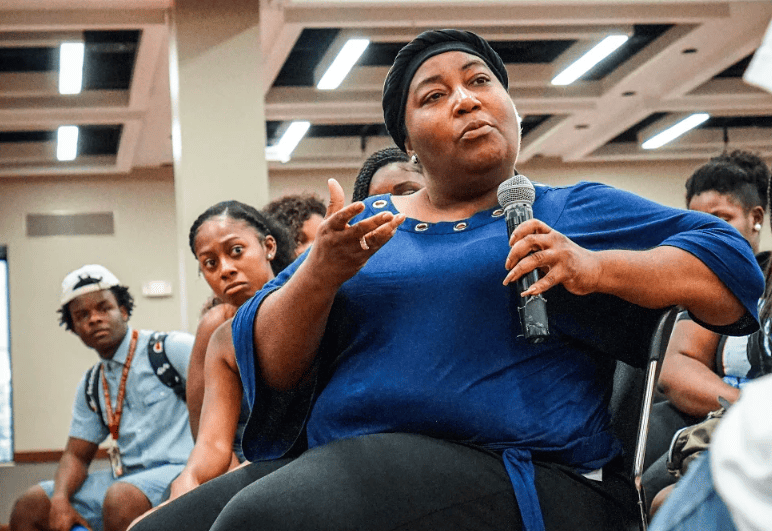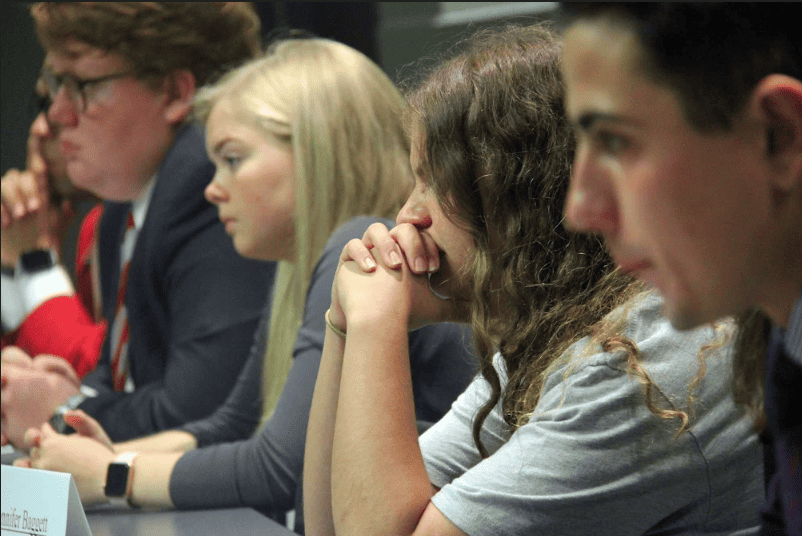Members of the UA community ask for an end to the silence
September 13, 2019
Deja Hampton is an involved student. She’s a double major in biology and dance, with her eyes set on law school. She’s a member of Women of Excellence and the Hispanic Latino Association, and as a resident advisor, she can remember the names and faces of each and every one of her tenants in Tutwiler Hall.
But when she tried to identify the University’s president, Stuart Bell, she fumbled.
“Honestly, I’ve been so detached from the president that I don’t know his name,” she said.
For Hampton, that wasn’t a sign she didn’t care, or that she wasn’t involved. It was a sign of the distance she feels from decision-makers on campus – a kind of distance that has made her grow tired of the place she once called home, and a kind of distance that was echoed by several members of the UA community on Thursday evening.
“I was excited to come here,” she said. “But, now I’m just trying to hurry up and get my degree.”
That’s what Hampton told her peers at one of three public meetings on Thursday, Sep. 12, which were planned to provide UA students, staff, faculty and administrators an outlet to discuss concerns, as well as possible actions, in response to the recent resignation of Jamie R. Riley, the former dean of students.
Events began at 5 p.m. with a public conversation sponsored by the Black Faculty and Staff Association (BFSA), but some confusion arose when a Student Government Association (SGA) Town Hall forum and a poorly advertised Senate meeting conflicted with each other, making it impossible to attend the entirety of both.
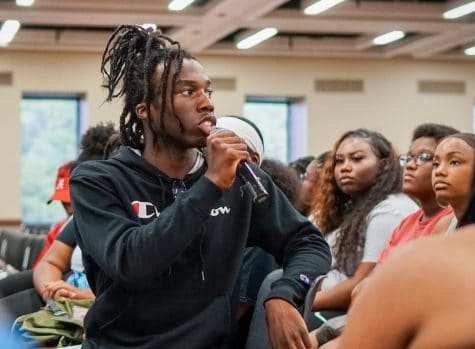
BFSA Meeting – 5 p.m.
A meeting hosted by the BFSA was the first one open to students this year and saw a turnout of more than 100 in the Ferguson Center ballroom.
André Denham, an associate professor at The University of Alabama and president of BFSA, opened the meeting by stating the association’s concern about the circumstances surrounding Riley’s resignation.
“It seemed that the article came out one day, and Dr. Riley resigned the next, so the University not clarifying what’s happening is making folks a little nervous,” he said.
Denham reminded those in attendance that the primary mission of the BFSA is to meet the educational needs of black students on the University’s campus. He emphasized that this meeting was not intended to compete with the SGA forum immediately following and encouraged the crowd to attend.
Several student remarks highlighted Riley’s character and his impact on their experience at the University.
One student described Riley as a visible and accessible example of servant leadership at the institution. A graduate student shared an experience where he felt targeted by the University of Alabama Police Department. He said Riley advocated for him, and he believed Riley was an advocate for all students on campus. Another spoke of his interactions with Riley through his involvement in BRIDGE, a program for first-year male students of color at the University, and described the pain of seeing “another instance of a black man being punished for speaking his truth.”
An overarching desire to find allies within administration surfaced in multiple student remarks, but while several administrators were present, none of them said they were involved in the decisions surrounding Riley’s resignation.
Denham encouraged students to be proactive in their involvement during the search for the next vice president of student life following the recent resignation of David Grady, because this person will be responsible for selecting the next dean of students. He said that same energy should be put into the search for a new dean of students, as well as the selection process for students who may be involved in each search.
Hampton said incidents in the past received temporary attention before simply “dying down.” She said she believed this is because concerned students are unable to speak directly to administration and questioned the possibility of having upper administration present at future meetings rather than “talking amongst themselves.”
Attention was also drawn to the University’s commitment to “promote equity and inclusion.” Riley’s resignation was seen among students in attendance as a way to invalidate his opinions and his ability to express them while simultaneously disrespecting his position and profession.
“He was bullied, and we’re going to suffer the consequences,” one audience member said. “Our leaders are afraid to stand up for us when they could and they should. We have to look at how this is going to negatively impact us. This isn’t just about him.”
“Forced to be silent is one thing, scared to be heard is another,” another audience member said.
At the close of the forum, members continued to highlight issues of voice, clarity and the need for mobilization. Closing remarks evoked the words of Rep. John Lewis and what it means to “get in good trouble” and “fight the good fight.”
“BFSA hears you,” Denham said. “This will not be the last time we do something like this.”
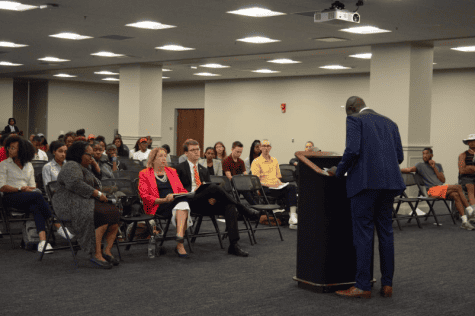
SGA Town Hall – 6 p.m.
After the BFSA meeting, a crowd of about 50 gathered in John England Jr. Hall to voice their concerns regarding diversity and equity on campus, following the resignation of former assistant vice president and dean of students Jamie Riley. The town hall was organized by the Student Government Association.
Several members of the administration were in attendance, including:
-
G. Christine Taylor, vice president and associate provost for Diversity, Equity and Inclusion
-
Kathleen Cramer, interim vice president of Student Life
-
Monica Watts, associate vice president of communications
-
André Denham, Black Faculty and Staff Association president
-
Ruperto “Toti” Perez, associate vice president of Student Health and Wellbeing
-
Tawanna Brown, case manager for Student Care and Wellbeing
-
Andrea Early, staff therapist with the Women and Gender Resource Center
-
Lane McLelland, director of the Crossroads Community Engagement Center
-
Erika Mason-Imbody, assistant to the vice president
-
Nyerere Tryman, director of Housing Operations
Some attendees submitted questions before the meeting while others asked them during the town hall. Demarcus Joiner, vice president of Diversity, Equity and Inclusion, began the meeting by noting that the SGA and the administration members present would not comment on Riley’s resignation.“[Riley] and the University mutually agreed upon his resignation and mutually agreed to no further comment,” Joiner said. “We will honor and respect Dr. Riley’s agreement.”
While Cramer answered some of the questions, Taylor fielded the majority of them with many of the questions focusing on Riley’s resignation and a general feeling of minority students feeling unheard and unsure of their place at the University.
SGA President Harrison Adams said it is his “sincerest hope” that dialogues like the town hall will bring the school community closer together and will push the school toward a future “that is stronger and more unified than ever before.”
“I understand that I will never completely understand the hurt you feel,” Harrison said. “Every day, I work hard to put my feet in the shoes of people different from me, and in realizing that I am privileged, I will use my platform to advocate for the voices of all of our students here at the University.”
Joiner said Taylor volunteered her office to host and schedule meetings with University leadership and mentioned these new meetings will be an extension of UA President Stuart Bell’s “fireside chats,” where he meets with student leaders to discuss the concerns of students.
Jeremy Boyd, a sophomore majoring in creative media and African American studies, said he is concerned about the silence from the University regarding Riley’s resignation and the inability of students to voice their concerns to higher members of the administration.
“It all feels very superficial to me,” Boyd said. “I guess we’ll just have to wait and see if anything comes of it, as always.”
Other students echoed Boyd’s concern about the University’s reluctance to comment further on Riley’s resignation. One student in attendance asked why the University has “allowed Breitbart to determine who their faculty is.” Taylor responded, cautioning against drawing a connection between Riley’s resignation and the Breitbart article that resurfaced his past tweets without the full details of why Riley resigned.
“It’s important that we are careful not to assume a causal relationship,” Taylor said. “What we know is that there was a Breitbart article. We know that Dr. Riley resigned. But we don’t know that A caused B.”
Farrah Sanders, a senior majoring in news media, said she felt the town hall was a valuable opportunity for students to express their concerns and have their voices heard by administrators.
“I feel as though some questions were answered and we got a little insight,” Sanders said. “I feel some questions weren’t understood, but I feel like students can walk away from this with a little bit of understanding that there are some people that are at least trying.”
Amid questions from students on whether their concerns will be taken seriously, Taylor assured students that she takes their concerns “very seriously,” speaking of her experience as a young black girl who integrated her elementary school and saw the Ku Klux Klan burning a cross at the end of her street at 5 years old.
“For most of my career, I’ve been the first and/or only,” Taylor said. “What you’re working through, I have lived it. And this can go in the newspaper, you can quote me. If I don’t have faith that the organization I’m working with is trying to do better, I need to pack up and go. And I mean that with everything that I am. I’m here because I know what the hell it feels like to be on the outside with nobody thinking you should be there, nobody respecting your position. So I’m here because I believe we can make a change.”
Taylor also encouraged students not to be discouraged and to continue reaching out to administrators to enact change on campus with the same passion they showed at the town hall.
“What you have to do is stay in the game, go hard in the paint for this campus,” Taylor said. “Because I don’t understand the logic of, if you have paid tuition at this campus, why you would settle for anything less than a first-class experience. And I’m here to help you do that, but I need you to help me by showing up, being consistent, being involved, being engaged.”
One group utilized the town hall as a space to propose said change. A letter from the Black Student Leadership Council was distributed to attendees that expressed disapproval regarding Riley’s resignation and listed three proposed solutions to concerns that were brought to the organization’s attention from students, faculty and staff.
The first proposed solution in the letter is to require diverse representation and transparency throughout the hiring and selection process of administrators, faculty and staff. The second is a requirement for a “monthly” meeting with higher administration “in order to fully express our concerns from a student’s perspective,” as well as one meeting per semester with the Board of Trustees. The third requires all entering students to undergo a mandated diversity, equity and inclusion (DEI) curriculum and student organizations to undergo DEI certification and training.
“We fervently believe that diversity is our greatest asset, and we welcome all efforts to create a more welcoming community for our students,” the letter stated. “If we are to hold the creed true to our hearts, then we must lead with a commitment of honor, transparency, and authenticity.”
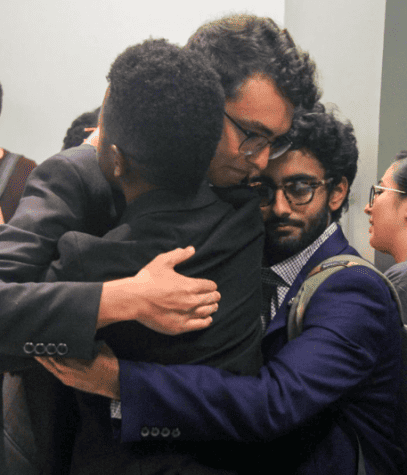
SGA Senate – 6:30 p.m.
Meanwhile, halfway through the town hall meeting, the forum room on the third floor of the Ferguson Center was brimming with students who wanted to make their voice heard – this time to a different set of decision-makers.
Around 70 students, in addition to 50 senators (including four proxies) on the floor, were present at this week’s SGA Senate meeting to hear a new resolution to affirm free speech on campus, presented by arts and sciences senator Jack Kappelman. Of those 70 students, 13 spoke out on their grievances about Riley’s resignation and their concerns about their physical and emotional safety on campus as well as their ability to do research that reflected the content of Riley’s tweets.
You can view SGA’s live stream below, which starts a few minutes into the meeting.
Kelvon Wiggins, a freshman majoring in dance, said he wasn’t on campus long before a large group of white men shouted at him and called him the N-word while he was walking to class.
“I want you guys to think about where you are placing yourselves in history,” he said to the senators.
Another student pointed out the glaring disparities between who was voting and the students there for public comment. She noted that only four students of color were voting that night and urged the majority-white senate to vote “yes” on the bill.
The Student Government Association also came under fire for failing to advertise the Senate meeting. Udonna Simpson, a member of the Future Black Law Student Association, alleged SGA had its own part in perpetuating the problem of distance.
“This is where the decisions are being made, but there is a meeting at 6:00 that we were supposed to go to, but no one knew about this meeting, so tell me how that happened,” Simpson said. “I ask you to make the right decision. Not the just decision, but the right decision.”
This student was the last to speak, as public comments took up the allotted 30 minutes, a rule that is listed in chapter 1002.2.1 of the SGA Code of Laws.
Before the Senate discussed R-42-19, the free speech resolution, three items on the docket were passed unanimously, including a formal recognition of a donor’s birthday, a resolution commending the SGA for providing free Adobe products to students and an action item affirming the 2020 budget.
You can view the docket with each resolution below.
Of an overall $140,000 budget, $8,200 was earmarked for an awards banquet, in which about $2,500 is given to faculty and staff. By contrast, each branch in charge of facilitating initiatives and programs for the general student population, such as external affairs, student affairs, academic affairs and diversity, equity and inclusion, is allotted $2,300 for the fiscal year. Kappelman was quick to take issue with that.
“I’m fundamentally opposed to any sort of money going to us celebrating ourselves,” he said to his fellow senators.
The Senate approved the item with a unanimous vote, and, almost an hour into the meeting, it was time to introduce resolution R-42-19, a resolution to reaffirm The University of Alabama’s commitment to protecting the freedom of speech for students, faculty and staff.
Kappelman, the author of the resolution, began by reading a letter that was signed by 533 students representing every college at the University. He noted that, with the exception of Senator Royce Dickerson, that number was greater than the number of votes cast for any sitting senator during their election.
Before the Senate cast a vote, Senator Ellen Walton, representing the college of commerce, proposed an amendment to remove clauses four, five and six from Kappelman’s resolution “on the grounds that they are inconsistent with the piece of state legislation that they recognize.”
Clauses four, five and six are as follows:
(4) WHEREAS, The University of Alabama is bound by HB 498 to defend the freedom of speech for its students, faculty, and staff; and
(5) WHEREAS, HB 498 ensures that no public University may take disciplinary action against any students, faculty, or staff for exercising their freedom of speech; and
(6) WHEREAS, The University of Alabama has not reaffirmed its commitment to the protection of freedom of speech for students, faculty, and staff following the resignation of Dr. Jamie Riley;
House Bill 498 requires public colleges and universities to enact policies protecting freedom of speech on campus, however this bill does not go into effect until July 1, 2020.
Because clauses four, five and six referred to House Bill 498, Walton argued that the proposed resolution was inconsistent with the piece of state legislation.
Kappelman objected to Walton’s amendment, arguing that the removal of the three clauses would wipe away the intention of the bill, thereby rendering it an “improper amendment.”
Parliamentarian Hani Razavi ruled that the amendment still upheld the initial intention of the bill, and the amendment to the resolution to remove the clauses was passed by a 34-9 vote.
Will Schramm, a senator from the college of commerce who voted yes on the first amendment, then proposed to add the sixth clause, which regarded Dr. Jamie Riley’s resignation, back into the resolution. The proposed re-addition of the sixth clause did not pass by a two-thirds vote, 25-17.
You can view which senators voted for and against each amendment below.
After the vote, Senator Walton stood up and explained her motivation behind the amendment to the resolution. Walton was only able to get a few words in before students expressed their distaste with her assertion that she was committed to SGA’s motto of “students serving students.”
“We should not pigeon-hole this issue onto a single situation,” Walton said. “We should leave this open so that if something else happens we can say, ‘Hey, we believe in free speech – not because of XYZ situation, not because of XYZ state bill, but because that’s what we believe as human beings.”
Though he voted against the initial amendment, Senator Brandon Slappy cited the inclusion of H.B. 498 as the reason for others’ support of the initial amendment. But for Slappy, clarity surrounding Riley’s resignation outweighed concerns about the reference to a premature state bill.
“I think the University should have been more clear about that,” he said. “That’s why I voted to not strike down those three clauses.”
Kappelman and senators Katie Ray and Isabella DeSheplo were vocal about the message they felt SGA was sending to the students who had come to voice their concerns.
“Dr. Riley’s name does not deserve to be washed away,” said DeSheplo, a senator from the graduate school.
Ray left the room during the meeting and came back in tears. She said the gutting of the last three clauses was an affront to her Hispanic heritage.
Kappelman was also brought to tears at the end of the meeting, which adjourned with a student shouting to the floor of senators, “The next time somebody calls you a racist, say ‘yeah.’”
“Honestly I don’t even know what to think anymore,” Kappelman said. “To vote ‘no’ on this resolution is to say we don’t support free speech, but to vote ‘yes’ on this resolution is to allow all of these people who just gutted everything that’s important and all the hurt that is being felt on this campus, they’re going to sleep OK tonight. They’re going to be happy with themselves for passing the weakest resolution that they can and instead of actually having a spine, the SGA is bowing down to the exact reason why we are here tonight … to address the racism that this campus is facing.”
Jackson Fuentes, SGA press secretary, gave a statement about the passage of the final resolution, which alludes to a recent press release announcing new “initiatives to foster campus diversity,” such as a DEI certificate program and a multicultural leadership council.
“The Student Government Association agrees that the right of all people to freely express themselves is of utmost importance,” he said. “Through initiatives like the diversity, equity and inclusion town halls, we continue to engage in an open dialogue around these and other issues.”
Several senators stayed after the meeting to exchange contact information with the students who publicly commented. Kappelman told The Crimson White after the meeting that he wished every Senate meeting had as many non-SGA students attend as the one on Thursday night.
Fuentes acknowledged some technical malfunctions during the livestream and a failure to post a notice of the Senate meeting on Facebook, which is usually a weekly practice, he said. For students who want to know more about how meetings are run, Fuentes suggested they utilize SGA office hours, which run from 12 p.m. to 2 p.m. next Monday and from 10 a.m. to 1 p.m. next Thursday.
“Any time that we see students express a concern, it’s a reality check to us to go out and talk to those students,” Fuentes said. “We don’t want to leave anybody in the dark. We’re always glad to hear those concerns, because that gives us something to improve upon.”
But for Kappelman, the final vote was a reflection of SGA’s failure to do just that. To him, it was a symbol of what happens when a majority of Senate seats are filled by white students and Greek-affiliated students. It signaled the same kind of distance Hampton referenced earlier.
“SGA is all about the false premise that it’s students serving students,” Kappelman said. “It’s privileged students serving themselves, and that was just on blatant display tonight.”
STILL WAITING
In the event of controversial news, the president of the University typically sends out a message addressing concerns or affirming the University’s commitment to the well-being of all students. Historically, Bell has sent messages like these after racist graffiti was found in a residence hall, after reports of sexual assault on campus came to light and after a sorority recruitment video failed to show any women of color – among others. But it’s been eight days, and the only official statement the University has given about Riley’s resignation reads as follows:
“Dr. Jamie Riley has resigned his position at The University of Alabama by mutual agreement. Neither party will have any further comments.”
In addition to the SGA, several students and faculty have been pushing UA administration to give some clarity about Riley’s resignation over the past week. For Hampton, the silence has been noted.
“At this point, I don’t even want a message from the president that’s been well-thought-out about how to pacify us for the moment,” she said. “I want to talk to you to your face so that you can see us hurt, so that you can see us crying and angry. I don’t want you to have time to consult with your team about what to say next. You need to face us and see us.”
On Friday, Sept. 13 at 3:31 p.m., The Crimson White reached out to university spokesperson Chris Bryant inquiring on a date and time that an official statement would be made and received an emailed response at 5:13 p.m. with no additional information.
At 4:31 p.m. the same day, Bell responded to Kappelman’s original letter that received 533 signatures, which was sent on Thursday, Sept. 12 at 8 a.m. and was published in The Crimson White on Thursday at 10:53 a.m.
The emailed response reads:
“Thank you for sharing your thoughts and ideas. Dr. Christine Taylor, Dr. Kathleen Cramer and I have been engaging in conversation around these issues with students and faculty. Just as those meetings are taking place, so are internal conversations with my leadership team. All of these will continue as we always encourage open and respectful dialogue on our campus.”
“This response leaves a lot to be desired,” Kappelman said.
At 5:24 p.m. on Friday, the Black Faculty and Staff Association tweeted a letter sent to Bell outlining concerns surrounding the resignation of Riley and requesting a meeting with Bell the next week. You can view their letter below.
BFSA is concerned about the circumstances surrounding the resignation of Dr. Jamie Riley. Here is a letter outlining our concerns that was sent to President Bell. pic.twitter.com/Pudt72BUdN
— UA BFSA (@bfsa_ua) September 13, 2019



